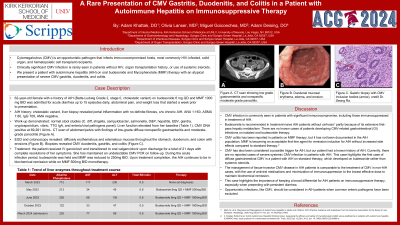Tuesday Poster Session
Category: Liver
P4852 - A Rare Presentation of CMV Gastritis, Duodenitis, and Colitis in a Patient With Autoimmune Hepatitis on Immunosuppressive Therapy
Tuesday, October 29, 2024
10:30 AM - 4:00 PM ET
Location: Exhibit Hall E

Has Audio

Adam Khattak, DO
Kirk Kerkorian School of Medicine at the University of Nevada
Las Vegas, NV
Presenting Author(s)
Adam Khattak, DO1, Olivia Lanser, MD2, Miguel Goicoechea, MD3, Adam Deising, DO4
1Kirk Kerkorian School of Medicine at the University of Nevada, Las Vegas, NV; 2Scripps Green Hospital, La Jolla, CA; 3Scripps Clinic, La Jolla, CA; 4Scripps Clinic Medical Group, La Jolla, CA
Introduction: Cytomegalovirus (CMV) is an opportunistic pathogen that infects immunocompromised hosts, most commonly HIV-infected, solid organ, and hematopoietic cell transplant recipients. We present a patient with autoimmune hepatitis (AIH) on immunosuppression with an atypical presentation of severe CMV gastritis, duodenitis, and colitis.
Case Description/Methods: A 62-year-old female with a history of autoimmune hepatitis (AIH) (Batts-Ludwig Grade 2, stage 0) on budesonide 6 mg q.d. and Mycophenolate (MMF) 1000 mg b.i.d. was admitted for acute diarrhea. She initially underwent evaluation in the urgent care noting unremarkable labs with a normal CT scan of the abdomen/pelvis and discharged home. She returned to the hospital two days later with 15 non-bloody diarrhea episodes daily, abdominal pain, and weight loss. Stool studies were normal; CMP revealed an alkaline phosphatase 225 U/L, AST 77 U/L, and ALT 99 U/L all elevated from her baseline. CMV DNA returned positive at 69,281 IU/mL.
A repeat CT scan of the abdomen/pelvis this admission showed thickened loops of small bowel and colon consistent with enteritis and pancolitis. An upper endoscopy and colonoscopy were performed revealing diffusely erythematous and edematous mucosa throughout the stomach, duodenum, and colon with erosions in the gastric antrum, duodenal bulb, ascending colon, and terminal ileum. Biopsies revealed CMV duodenitis, gastritis and colitis. The patient received IV ganciclovir and transitioned to oral valganciclovir upon discharge with complete resolutions of her symptoms on follow-up.
Discussion: CMV infection is commonly seen in patients with significant immunocompromise. Here, we present a case of a patient with AIH on oral budesonide and MMF therapy who was found to have CMV infection manifesting as gastritis, duodenitis, and colitis. There are no known cases of patients developing CMV related gastrointestinal (GI) infection on isolated oral budesonide therapy, partly because of its extensive first pass hepatic metabolism. CMV colitis has been reported in patients on MMF therapy, but it has not been documented in the AIH population. CMV has also been considered a possible trigger for AIH, but our patient was with known history of AIH. This case highlights the importance of keeping a broad differential for AIH patients on immunosuppressive therapy, especially when presenting with persistent diarrhea. Opportunistic infections, like CMV, should be considered in AIH patients when common enteric pathogens have been excluded.

Disclosures:
Adam Khattak, DO1, Olivia Lanser, MD2, Miguel Goicoechea, MD3, Adam Deising, DO4. P4852 - A Rare Presentation of CMV Gastritis, Duodenitis, and Colitis in a Patient With Autoimmune Hepatitis on Immunosuppressive Therapy, ACG 2024 Annual Scientific Meeting Abstracts. Philadelphia, PA: American College of Gastroenterology.
1Kirk Kerkorian School of Medicine at the University of Nevada, Las Vegas, NV; 2Scripps Green Hospital, La Jolla, CA; 3Scripps Clinic, La Jolla, CA; 4Scripps Clinic Medical Group, La Jolla, CA
Introduction: Cytomegalovirus (CMV) is an opportunistic pathogen that infects immunocompromised hosts, most commonly HIV-infected, solid organ, and hematopoietic cell transplant recipients. We present a patient with autoimmune hepatitis (AIH) on immunosuppression with an atypical presentation of severe CMV gastritis, duodenitis, and colitis.
Case Description/Methods: A 62-year-old female with a history of autoimmune hepatitis (AIH) (Batts-Ludwig Grade 2, stage 0) on budesonide 6 mg q.d. and Mycophenolate (MMF) 1000 mg b.i.d. was admitted for acute diarrhea. She initially underwent evaluation in the urgent care noting unremarkable labs with a normal CT scan of the abdomen/pelvis and discharged home. She returned to the hospital two days later with 15 non-bloody diarrhea episodes daily, abdominal pain, and weight loss. Stool studies were normal; CMP revealed an alkaline phosphatase 225 U/L, AST 77 U/L, and ALT 99 U/L all elevated from her baseline. CMV DNA returned positive at 69,281 IU/mL.
A repeat CT scan of the abdomen/pelvis this admission showed thickened loops of small bowel and colon consistent with enteritis and pancolitis. An upper endoscopy and colonoscopy were performed revealing diffusely erythematous and edematous mucosa throughout the stomach, duodenum, and colon with erosions in the gastric antrum, duodenal bulb, ascending colon, and terminal ileum. Biopsies revealed CMV duodenitis, gastritis and colitis. The patient received IV ganciclovir and transitioned to oral valganciclovir upon discharge with complete resolutions of her symptoms on follow-up.
Discussion: CMV infection is commonly seen in patients with significant immunocompromise. Here, we present a case of a patient with AIH on oral budesonide and MMF therapy who was found to have CMV infection manifesting as gastritis, duodenitis, and colitis. There are no known cases of patients developing CMV related gastrointestinal (GI) infection on isolated oral budesonide therapy, partly because of its extensive first pass hepatic metabolism. CMV colitis has been reported in patients on MMF therapy, but it has not been documented in the AIH population. CMV has also been considered a possible trigger for AIH, but our patient was with known history of AIH. This case highlights the importance of keeping a broad differential for AIH patients on immunosuppressive therapy, especially when presenting with persistent diarrhea. Opportunistic infections, like CMV, should be considered in AIH patients when common enteric pathogens have been excluded.

Figure: A- CT scan showing low grade gastroenteritis, nonspecific moderate grade pancolitis; B- Upper EGD showing erythema and edema in the duodenum; C- Gastric biopsy with CMV inclusion bodies (arrow), credit Dr. Seong Ra
Disclosures:
Adam Khattak indicated no relevant financial relationships.
Olivia Lanser indicated no relevant financial relationships.
Miguel Goicoechea indicated no relevant financial relationships.
Adam Deising indicated no relevant financial relationships.
Adam Khattak, DO1, Olivia Lanser, MD2, Miguel Goicoechea, MD3, Adam Deising, DO4. P4852 - A Rare Presentation of CMV Gastritis, Duodenitis, and Colitis in a Patient With Autoimmune Hepatitis on Immunosuppressive Therapy, ACG 2024 Annual Scientific Meeting Abstracts. Philadelphia, PA: American College of Gastroenterology.

